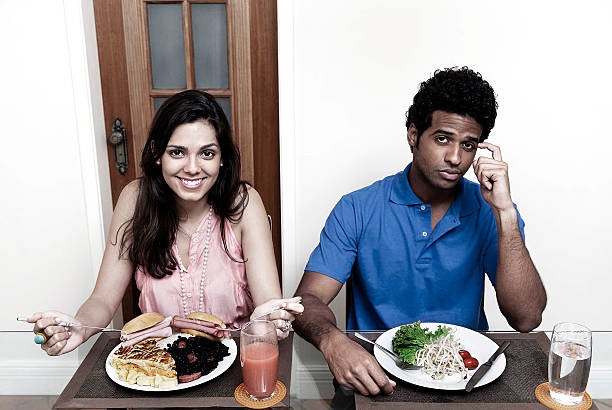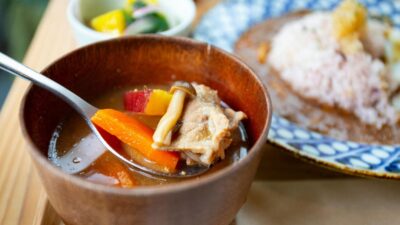Food matters right from the early stages of dating. Many singles notice each other’s eating habits during their first meals together. A survey in 2025 with 4,000 people showed that 66% find picky eating off-putting. This means if someone is seen as picky, they might be less attractive as a partner. People often watch how open someone is to new dishes or if they complain about what’s offered at the table.
Smelly foods, such as those loaded with garlic or foods that are messy to eat, often do not make the cut for first dates. These choices can cause awkward moments. No direct data exists in the studies for specific foods to avoid, but social customs tend to guide these decisions. Sharing an easy-to-eat meal helps avoid discomfort.
Eating Together Can Form Bonds
Sharing food is more than an activity. It can affect how two people connect. Research commonly finds that people who share meals together often feel more connected. Eating with others can act as a foundation for building trust and for enjoying each other’s company without outside distractions. People who often eat together tend to feel less alone.
Choosing to eat together regularly can add structure to a relationship. It becomes a regular point where partners talk, settle differences, or simply enjoy each other’s company. In some cases, this habit leads to greater satisfaction with the relationship. There is no exact number available for how often couples should share meals, but those who do so commonly report stronger connections.
Health, Taste, and Money in Food Choices
Preferences in food are not always about taste alone. A 2025 Pew Research Center survey looked at how people in the U.S. pick what they eat. Taste comes first for most, with 86% of women and 79% of men saying it is their top concern. Next, the cost matters, with 66% of women and 57% of men marking it as important. Health still plays a role, but not as much as taste or price.
What someone chooses to eat can say a lot about what they value. For instance, some will only pick healthy foods even when out with a partner. Others may go for what tastes best, ignoring calories or nutrition. These habits can affect how couples plan dates. If one person wants to eat fresh salads and the other prefers fast food, arguments can follow. The priority that each person gives to these reasons tells potential partners what life with them might look like.
The Social Impact of Throwing Away Food
Food choices also extend to how people see food safety and freshness. According to one survey, 43% of Americans say they throw away food that is near or past the package date. Calling off a dinner over concerns about expiration can show caution or carefulness. For some, this carefulness is important. Others might see it as wasteful or overly strict. These habits might seem minor, but shared or different attitudes about food safety could affect how often couples cook or eat together.
How Food Choices Can Reflect Partner Preferences
Personal tastes, from food to music, can influence who someone feels comfortable dating. For example, some people prefer partners who enjoy spicy foods or are open to trying new cuisines together, while others might avoid someone they think has too many food restrictions. In some cases, food can play a role in the type of people someone meets, such as joining plant-based cooking groups or wine-tasting meetups.
Relationship choices can also be shaped by these preferences. For instance, some who are interested in the high life and in elite social circles might be dating a sugar baby. Others might seek a partner who shares their enthusiasm for homemade meals or street food. These differences can steer dating paths in unexpected ways.
Picky Eating Can Close Doors
When dating, some people set a rule for food openness early on. If someone says “I don’t eat anything green” or “I only eat chicken nuggets,” it can sound hard to please. The 2025 survey above supports this, as most respondents say picky eating could rule out a date or stop things from moving forward.
Someone who is very selective about their food can come across as unwilling to try new things. For potential partners who value exploration in meals, this can become a concern. It may limit where the couple can eat or which social events they can attend together. In some families or circles, trying each other’s food is part of showing care. Refusing can appear rude or put up a wall, so singles sometimes look for similar levels of openness when choosing a partner.
How Food Habits Shape Social Circles
People often meet dating partners at events linked to food. This can be a cooking class, a group dinner, or something more casual like a picnic. Those who share a taste for certain foods might join specific groups. For example, a vegan might seek plant-based meetups, meeting others who share this practice. Someone interested in wine may go to tastings and meet others who also enjoy it.
These patterns show that food choices can set up the setting for meeting people and making a match possible. When two people enjoy the same foods, planning a meal or a date is easier. Disagreements over food can mean fewer shared events because deciding where and what to eat causes conflict. If one person always wants sushi and the other cannot stand it, they may spend less time together.
Planning and Compatibility
Food choices also impact planning in a relationship. If one person enjoys homecooked meals and likes to spend weekends trying new recipes, their partner usually needs to be interested too. Otherwise, the activity becomes something they do alone. In some cases, couples adjust and compromise, but in other cases, mismatched food interests lead to less satisfaction.
On the practical side, partners often need to buy and share groceries. If both want healthy options, shopping is simple. If they disagree on what food is “safe” to eat as seen in the survey about expiration dates, this could cause waste or frustration. Shared priorities mean fewer disputes later.
Food Choices and Dating Ideals
For some, the partner’s food choices can tie into larger ideals. People with ethical food values look for someone who shares them. These values might include plant-based eating, organic products, local foods, or eating only certain types of meat or seafood. When someone does not share these standards, it can create tension.
Preferences around food can become a filter when choosing whom to date. If both people have matching ideals and preferences, it supports the smooth planning of meals, celebrations, and daily life. When they differ, both must find a way to adjust, which can work but demands effort from both sides.
Conclusion
The studies and surveys suggest that food preferences do affect dating and relationships. Picky eating can make someone less attractive to potential partners. Sharing meals tends to increase closeness. The values behind what people eat, their openness to new foods, and even how they deal with food safety have an effect on who they form connections with. These differences and similarities can shape how people meet, who they want to date, and how well they function as a couple.



